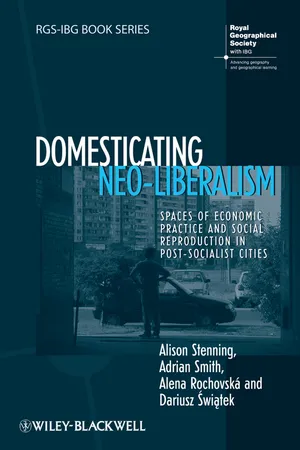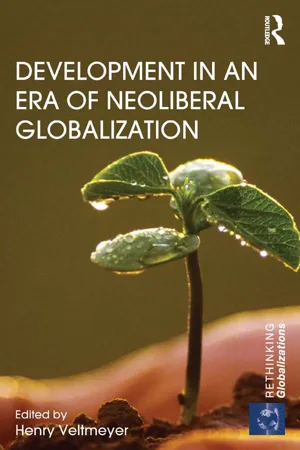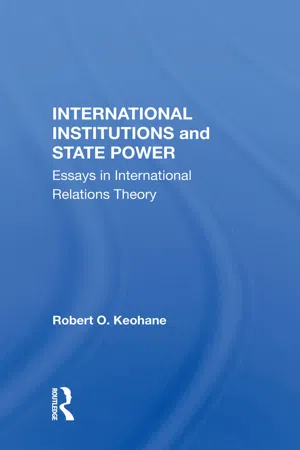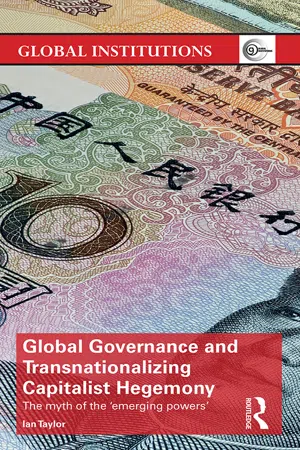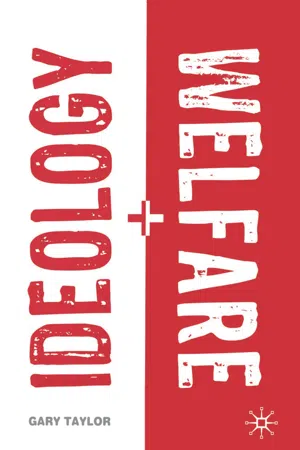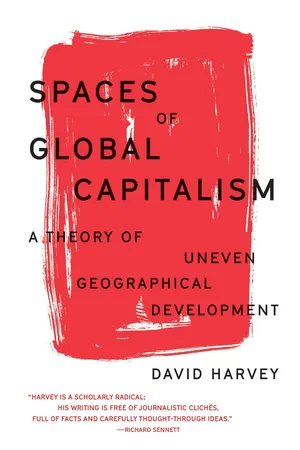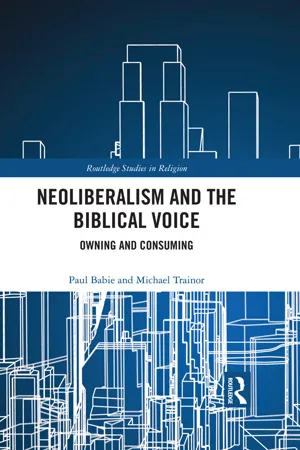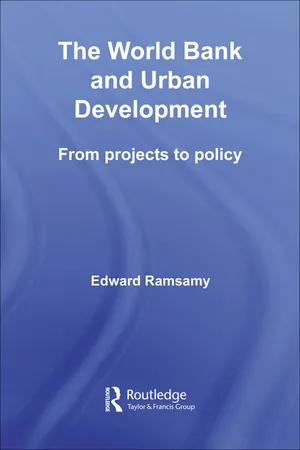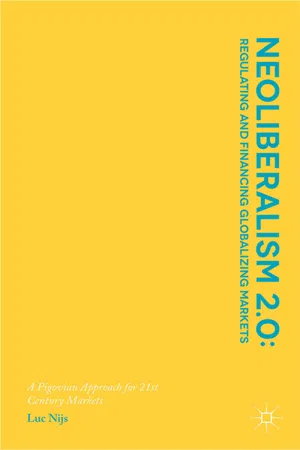Politics & International Relations
Neo-liberalism
Neoliberalism is an economic and political ideology that emphasizes free-market capitalism, deregulation, and limited government intervention in the economy. It promotes privatization, free trade, and individual responsibility, aiming to create a more efficient and competitive market. Neoliberal policies have been influential in shaping global economic systems and have been both praised for promoting economic growth and criticized for exacerbating inequality and social disparities.
Written by Perlego with AI-assistance
Related key terms
Related key terms
1 of 4
Related key terms
1 of 3
10 Key excerpts on "Neo-liberalism"
- eBook - ePub
Domesticating Neo-Liberalism
Spaces of Economic Practice and Social Reproduction in Post-Socialist Cities
- Alison Stenning, Adrian Smith, Alena Rochovská, Dariusz Świątek(Authors)
- 2011(Publication Date)
- Wiley-Blackwell(Publisher)
Chapter Two Neo-liberalism and Post-Socialist Transformations Theorizing Neo-liberalism Definitions, emergence and central tenets In his critical account of global Neo-liberalism, Harvey (2005: 2) argued that:Neoliberalism is in the first instance a theory of political economic practices that proposes that human well-being can best be advanced by liberating individual entrepreneurial freedoms and skills within an institutional framework characterized by strong private property rights, free markets, and free trade.Such a conception of political-economic change has its ‘prehistories’ (Peck, 2008) that lead back to the twentieth-century thinking of the Austrian liberal political economists Friedrich August von Hayek (1994) and Ludwig von Mises (1996) and to debates over the possibilities for state intervention in economic life (Lange, 1994; Friedman & Friedman, 1990). It is not our purpose here to provide a historiography of neo-liberal ideas; rather we focus upon the central tenets of what has become widely recognized as the political economy of Neo-liberalism (Peck & Tickell, 2002; Tickell & Peck, 2003) and relate these to ongoing post-socialist transformations. These tenets have been steadily institutionalized through wide-ranging, global networks of political intervention and economic policy and have come to be seen – not unproblematically – as one of the dominant projects of contemporary capitalism.The first tenet of Neo-liberalism is the claim that the market is the only and most effective way to organize human existence and should be extended to as many spheres of life as is possible. There should be freedom for capital, goods and services, with limited direct governmental intervention. Private owners of capital and entrepreneurs should be left to self-regulate their market activities. Markets are seen to lead ultimately to an equalization of social outcomes as wealth famously ‘trickles down’ from rich to poor. It is the role of government, therefore, to remove impediments to capital mobility, and the state should be charged only with setting the regulatory context within which the market can most freely operate and upholding the rule of law. The promotion of markets connects to state deregulation of the economy and the pursuit of an agenda of privatization, all of which have been central planks of the various post-socialist reform agendas pursued since the collapse of communism (Smith & Pickles, 1998; Stenning & Bradshaw, 1999). The creation of private property rights through mass privatization and through the development of new private firms has been dramatic. Yet, as many have recognized, the particular ways in which private property has been created have often involved, worked through, and been embedded within already existing constellations of power and control in the economy, what Stark (1996) has called ‘recombinant property’ (see also Grabher & Stark, 1997; Smith, 1998). A further tenet is that the state should do all it can to reduce public expenditure. Not only does this follow the monetarist agenda of fiscal austerity, but it is also part of withdrawing the state, as far as possible, from direct intervention in society. However, as many critics of Neo-liberalism have pointed out, despite the rhetoric of state withdrawal, most neo-liberal states have in fact restructured activity towards de facto - Henry Veltmeyer(Author)
- 2013(Publication Date)
- Routledge(Publisher)
To begin, let us start with a definition of ‘neoliberalism’. This shares with classical liberalism the belief in the efficacy of market mechanisms for the allocation of resources and the reward of factors of production. It is based on the belief that markets are competitive, or can be made competitive by deregulation, and that competitive markets, based on private ownership, produce the most efficient economies and highest levels of welfare. Thus, a menu of neoliberal policies can be readily identified. A strong preference for privatization and deregulation underpins this menu and is applicable to the vast majority of areas of production, including the markets for labour, capital, land and natural resources.There are, however, some areas of ambiguity. Two of the most important examples of these are the topics of money and regionalism. There is no neoliberal position on money, with some writers (such as Hayek) advocating private money issuing banks, others (such as Friedman) preferring national monies but with flexible exchange rates, while others still (such as Mundell) prefer a world currency. Similarly, some neoliberals see regional trading areas as stepping stones to global free trade, while others (such as Bhagwati) see them as undesirable distractions from the multilateral cause. There are also disagreements about the sequencing of market liberalization; with respect to capital account liberalization, for example. Thus, neoliberalism should not be seen as a monolithic body of thought: there are areas of considerable dispute between its followers. Nevertheless, there is still an identifiable core set of policies, based on privatization and deregulation, which gives this school of thought its coherence.As noted, neoliberalism shares this coherence with classical liberalism. The prefix ‘neo’ often serves little purpose other than denote the new time period, since about 1980, in which liberal ideas have returned to the ascendancy. ‘Neo’ therefore indicates that we are talking about the late twentieth and early twenty-first centuries rather than the mid-nineteenth century. There is one other reason for using ‘neo’ which I think is worth discussing. This relates to governance. Put simply, classical liberal thought is typically associated with democracy as a system of governance. This, despite the fact that there was very little democracy about in the mid-nineteenth century and this was the era of anti-democratic colonialism. Neoliberalism, in contrast, has no such necessary association with liberal democracy. It is primarily an economic concept dedicated to ‘free markets’, but this can be, and has been, implemented in a variety of polities, from representative democracy to authoritarian. The governance structures of neoliberalism are, therefore, ‘underdetermined’.2- eBook - ePub
International Institutions And State Power
Essays In International Relations Theory
- Robert O Keohane(Author)
- 2020(Publication Date)
- Routledge(Publisher)
7 explore the operation of reciprocity and examine the issue of institutional change via a comparison of rational-choice and reflective approaches to this issue.Neoliberal Institutionalism and Liberalism
Liberalism is sometimes identified as a belief in the superiority of markets to state regulation of an economy. Thus defined, liberalism would be a highly inappropriate label for my work, which stresses the importance of international institutions, constructed by states, in facilitating mutually beneficial policy coordination among governments.13 Another conception of liberalism associates it with a belief in the value of individual freedom. Although I subscribe to such a belief, this commitment of mine is not particularly relevant to my analysis of international relations. One could believe in the value of individual liberty and remain either a realist or neorealist in one's analysis of world politics.But liberalism also serves as a set of guiding principles for contemporary social science. As a guide to social scientific thought, it stresses the role of human-created institutions in affecting how aggregations of individuals make collective decisions. It emphasizes the importance of changeable political processes rather than simply of immutable structures, and it rests on a belief in at least the possibility of cumulative progress in human affairs. In this sense, the work presented in this volume indeed reflects a liberal spirit. Institutions change as a result of human action, and the changes in expectations and processes that result can exert profound effects on state behavior.Consider the way in which international cooperation is viewed by neo-realiste on the one hand and neoliberal institutionalists on the other. Neorealiste and neoliberals agree that world politics lacks stable hierarchy and that, as Waltz (1959:186) puts it, "in anarchy there is no automatic hierarchy." But Waltz also admits that "there is no obvious logical relation" between this proposition and the statement that "among autonomous states war - eBook - ePub
Global Governance and Transnationalizing Capitalist Hegemony
The Myth of the 'Emerging Powers'
- Ian Taylor(Author)
- 2016(Publication Date)
- Routledge(Publisher)
Indeed, this requires a stable global system of multiple states to maintain the kind of order and predictability that capitalism requires. 105 Neoliberalism aims to “expand the scope for capital accumulation through privatization, and replac[e] collective welfare by entrepreneurship and individualism as the legitimating values of liberal democracy.” 106 In the emerging powers context, the imperialist nature of neoliberalism is at its most naked. Here, imperialism “is defined not by the export of capital, but by the export of capitalism : the social relations of production that define it and institutions devised to promote and sustain them. Second, as the central role of the UN suggests, it is led not by states but by international organizations committed to capitalism as a global project.” 107 Global restructuring along neoliberal lines, then, is an explicit project at the heart of the activities of the World Bank, IMF, etc., aimed at the completion of the world market and the global imposition of social relations and disciplines central to capitalist reproduction under the conditions of neoliberal globalization. 108 The responses to 2008 cannot be divorced from such realities. However, they are hidden by various discourses, which seek to mask their own partialities and present as wholly commonsensical their components. The effect is to present a set of policies permeated with the disciplines and class logic of finance capitalism as if they were inspired by disinterested benevolence. Conclusion The current agenda advanced by the main global governance arenas is premised on the notion that liberalization will facilitate positive development and elevate nations to the front rank of the global power system. 109 In the post-2008 crisis, incorporating putative challengers to the capitalist core (in terms of a realist reading of great power politics) became central - eBook - ePub
- Gary Taylor(Author)
- 2006(Publication Date)
- Bloomsbury Academic(Publisher)
For neo-liberals, it makes no sense for the state to promote social justice. Such ideas are thought to run counter to the natural order of things and tend to be designed by those who have very little understanding of the values embraced by their fellow citizens. Hayek (1944) was adamant that the government should not attempt to impose distributive or social justice upon its citizens. He argued that to secure such a state of affairs, the government would need to treat people differently and that it should always aspire to treat them the same. He pointed out moreover that it would be virtually impossible to secure a sufficient level of agreement on the scale of values and principles needed to secure social justice. In his view, such justice could only be achieved if absolute equality was established between citizens. However attractive this might sound, Hayek was convinced that such an aim was both unrealistic and lacking support from the majority of people (Hayek, 1944, pp. 79, 109). Neo-liberals consider it dangerous to give the state the power to discriminate against sections of the community through deliberate intervention. It was considered more prudent and just to leave things to the free flow of market forces.Neo-liberal social values attempt to recapture the spirit of individualism and self-help and to save us from what some regard as misguided social engineering. Neo-liberals place the individual at the centre of their analysis and have little time for those social values that require the government to act in a positive way to redistribute resources and opportunities to those who ‘fail’ in the free market system. Collectivism is rejected firmly in favour of a neo-liberal vision of individuals competing with each other to advance their own prospects and in so doing help to keep society vibrant and alive. For neo-liberals, it is foolish to underestimate the importance of individual self-interest and to penalise the rich in the interests of bailing out those who (for whatever reason) are unable to compete successfully. They warn us of the dangers of ‘dumbing down’ and of attempting to appeal to the masses with promises of equality and social justice. A neo-liberal world is one where individual freedom is placed above the apparent desire to make us similar (or even the same) and one where the functions of the state are severely curtailed.State and welfare
Given that neo-liberals extol the virtues of economic efficiency and low taxation, it should come as no surprise that they tend to be critical of the state playing a major role in the provision of welfare. Neo-liberals have been critical of supporters of the welfare state for concentrating too much upon trying to solve social problems. These problems are said to result largely from personal failings rather than from solvable economic fluctuations. Neo-liberals have criticised the broad sociological approach that looks to the state to solve problems faced by the individual and have argued that this approach has harmful effects upon the economy and will ultimately fail to achieve its goals (George and Wilding, 1994, p. 20). From a neo-liberal perspective, the state is an outsider that lacks sufficient understanding of the natural ebbs and flows of the capitalist economy and the need to provide people with incentives to do well. - eBook - ePub
Spaces of Global Capitalism
A Theory of Uneven Geographical Development
- David Harvey(Author)
- 2019(Publication Date)
- Verso(Publisher)
Externally, neo-liberal states seek the reduction of barriers to movement of capital across borders and the opening of markets (for both commodities and money capital) to global forces of capital accumulation, sometimes competitive but more often monopolistic (though always with the opt-out provision to refuse anything “against the national interest”). The powers of international competition and the ideology of globalization are used to discipline internal opposition at the same time as new terrains for highly profitable and in some instances even neo-colonial capitalistic activity are opened up abroad. In this sphere too, large corporate capitalist interests typically collaborate with government power in policy making as well as in the creation of new international institutional arrangements (such as the WTO or the IMF and the Bank of International Settlements).The neo-liberal state is particularly solicitous of financial institutions. It seeks not only to facilitate their spreading influence but also to guarantee the integrity and solvency of the financial system at no matter what cost. State power is used to bail out or avert financial failures (such as the US savings and loans crisis of 1987–8 and the three trillion dollar collapse of the hedge fund Long Term Capital Management in 1997–8). Internationally it operates through institutions such as the IMF to shelter investment banks from the threat of default on debts and in effect covers, to the best of its ability, exposures of financial interests to risk and uncertainty in international markets. This connectivity of the neo-liberal state to the protection of financial interests both promotes and reflects the consolidation of bourgeois class power around processes of financialization. In the event of a conflict between the integrity of the financial system and the well-being of a population, the neo-liberal state will choose the former.The neo-liberal state is profoundly anti-democratic, even as it frequently seeks to disguise this fact. Governance by elites is favored and a strong preference for government by executive order and by judicial decision arises at the expense of the former centrality of democratic and parliamentary decision-making. What remains of representative democracy is overwhelmed if not, as in the US, totally though legally corrupted by money power. Strong institutions are created, such as central banks (like the Federal Reserve in the US) and quasi-governmental institutions internally and the IMF and the WTO on the international stage, that are entirely outside of democratic influence, auditing, accountability and control. In the neo-liberal view, mass democracy is equated with “mob rule” and this typically produces all of the barriers to capital accumulation that so threatened the power of the upper classes in the 1970s. The preferred form of governance is that of the “public-private partnership” in which state and key business interests collaborate closely together to coordinate their activities around the aim of enhancing capital accumulation. The result is that the regulated get to write the rules of regulation while “public” decision-making becomes ever more opaque. - eBook - ePub
Neoliberalism and the Biblical Voice
Owning and Consuming
- Paul Babie, Michael Trainor(Authors)
- 2017(Publication Date)
- Routledge(Publisher)
Yet, as we will see, just as do neoliberal political-economic organisation and liberal law, liberal property offers no guidance on how to exercise choice within a web of social relationships. Others are seldom, if ever considered during the exercise of choice. And so, no matter how the choices look at the time they are made, they can have bad outcomes for others, for the community. This is the mirror image of the relational aspect of neoliberalism, or what we might call the relational aspect of private property.Before we come to property, however, we turn first to the fundamental concepts of neoliberalism, how it came to control us through its competitive rationality, and how that structures our lives through liberal law.II. Political-Economic: Neoliberalism and CapitalismThis section briefly demonstrates the ubiquity of neoliberalism in our world, emerging from liberal origins to become neoliberal politics and economics. It concludes, though, that neoliberalism was never an inevitable outcome. In fact, far from being the ‘natural’ way of doing things, it is a construct of the state just as is any other system of government or economics.27 And it all hinges on choice.A. Liberal OriginsWe may not realise it, recognise it or know it, but neoliberalism is all around us. While they abound, just two examples from among the myriad options available are enough to reveal its presence. The stories are found in two articles found in The Economist of 1 June 2013 (we could just as easily have found similar such stories in almost any other issue, although these two were especially helpful in making our point). The first explained how Britain, especially its youth, is becoming more ‘liberal’ (read ‘neoliberal’). The second boldly stated that liberalism/capitalism (read ‘neoliberal’) is solving the problem of global poverty.28 What both articles were claiming was that freedom and choice were flourishing in Britain, which was in turn having the effect of eliminating global poverty. Odd, while both articles cited statistics, it seems that global poverty is still with us five years later. Neoliberalism, though, asks us to place our trust in freedom of choice, as a form of Adam Smith’s invisible hand in the marketplace, allowing individual choice to, it is said, result in positive benefits for all, everywhere.29 - eBook - ePub
- Edward Ramsamy(Author)
- 2006(Publication Date)
- Routledge(Publisher)
Chapter 6Globalization, Neo-liberalism, and the politics of the World Bank’s current urban agenda
Globalization and Neo-liberalism have altered the nature and function of the state in both developing and developed countries. These twin pressures reinforced the World Bank’s conservative development philosophy in the 1990s. Three neo-liberal economic premises have undergirded Bank policy since the late 1980s (Bruno 1994: 2):- Attainment of sustained average per capita growth is a necessary condition for sustained reduction in poverty.
- Implementation of an adjustment package of policy reform is a necessary condition for sustained per capita growth.
- Fiscal and monetary restraint is a necessary condition for adjustment.
Acting on these premises, the World Bank pressured governments in developing countries to privatize or eliminate social welfare programs and promote fiscal conservatism until state policy began to mirror the behavior of the private sector. State involvement with social concerns became increasingly entrepreneurial, more committed to creating favorable investment environments for private capital than to equity or social justice.This chapter identifies some key problems with the free market fundamentalism evangelized by the Bank so fervently in the 1980s and early 1990s. Next, I describe some recent protest against Bank policies from civic groups and various NGOs. In light of their campaign, the Bank tried to reorient its agenda under James Wolfensohn. This section describes how social welfare concerns, largely ignored during the 1980s, were back on the Bank’s agenda. However, as the concluding section of the chapter shows, reform efforts were jettisoned after they created tensions within the institution and among Washington power brokers who were committed to the neo-liberal agenda. Current urban initiatives at the Bank continue to draw upon and promote neo-liberal principles. - eBook - ePub
Neoliberalism 2.0: Regulating and Financing Globalizing Markets
A Pigovian Approach for 21st Century Markets
- L. Nijs(Author)
- 2016(Publication Date)
- Palgrave Macmillan(Publisher)
117 Our review and positioning of the dominant liberalism trends will allow us now to better define and position neoliberalism.2.3Positioning neoliberalism and the objective of the free market
Neoliberalism as a term has been prone to the same vague demarcation lines as liberalism and its distinct classes in general, and is used in different settings, often with different connotations.118 In contemporary thinking, the term is often associated with suppression, poverty, capitalism, exploitation, and conspiracy theories of global capital. It is further seen as the direct driver behind such phenomena as free unregulated markets, privatization, globalization, monetarism, and deregulation, as well as the overall suppression of labor by capital. The concerning fact is that the literature often sees correlation even if there is none, and even causality without any direct or circumstantial evidence that traces certain significant events back to neoliberalism. The term has become prone to misappropriation, as it is now used in multiple dimensions while the real content of the term has started to shift (significantly) away from its original intent.119 This often happened when neoliberal thoughts were converted into political action and policy design. In that sense neoliberal policy (and in particular its economic chapter) has become disconnected from the fundamental values embedded in its (alleged) parent, the economic liberal ideology. Authors advocating neoliberalism have never constructed their thinking as neoliberalism, but as part of classical liberal theory or part of the doctrines developed by the Austrian, Chicago, or Virginia Schools,120 of economics and based their economic insights on classical economical thinking in a Smithian and Ricardian way. The abuse of the term neoliberalism happened because there is no real neoliberalism in place that would be truly new (‘neo’). A better term would have been ‘paleo-liberalism’121 - eBook - ePub
Towards New Developmentalism
Market as Means rather than Master
- Shahrukh Rafi Khan, Jens Christiansen, Shahrukh Rafi Khan, Jens Christiansen(Authors)
- 2010(Publication Date)
- Routledge(Publisher)
Mead was not alone in locating the chief significance of NAFTA in its intended effect on policy autonomy. Advocating NAFTA, Krugman (1993) argued that the economic effects of the agreement on the US economy would be negligible. In his view, NAFTA was primarily a “political” agreement, the main import of which was to ensure that future Mexican governments could not easily reverse the liberal economic reforms of the Salinas administration. Like Mead, Krugman recognized that NAFTA was not about trade so much as it was about establishing an external constraint on the present and future governments of the signatory countries. While Mead worried about what this meant for democracy, Krugman celebrated the improved investment climate these restrictions would establish.This chapter will examine ongoing intellectual and policy initiatives advanced by the economics profession and policy makers to lock in neo-liberal reform in developing countries by severely restricting the policy autonomy or policy space available to these countries. As NAFTA demonstrates, the profession has been wildly successful in achieving this objective. This is in part because it has advanced a two-pronged approach in the pursuit of Neo-liberalism. The first operates on an ideological level and involves the recent theoretical advances purporting to show that neo-liberal reform is the only viable avenue forward for developing countries. In this context, I will examine the rise of the theory of “policy credibility” during the 1980s and 1990s and its more recent incarnation in the aggressive form of the concept of “policy coherence.”The second front operates on the level of institutional reform, and involves new means by which Neo-liberalism can be achieved and secured against reversal in the (likely) case of opposition from those adversely affected, including any parties and leaders who seek alternative development paths. In this context, I will examine several institutional means by which Neo-liberalism is being cemented. These include the creation of independent central banks; inflation targeting regimes; currency boards that prevent elected governments from using financial flows and policy in the service of developmental and social goals; and small-group trade and investment agreements (of which NAFTA is an exemplar) that not only augment the power of international investors but also mobilize this power to punish governments that waiver from the neo-liberal path. Obviously, there are other institutional means by which Neo-liberalism is being cemented in developing countries, such as credit rating agencies and standards and codes (and the surveillance thereof ). For reasons of space, we will not discuss these latter two channels.2
Index pages curate the most relevant extracts from our library of academic textbooks. They’ve been created using an in-house natural language model (NLM), each adding context and meaning to key research topics.
Explore more topic indexes
Explore more topic indexes
1 of 6
Explore more topic indexes
1 of 4
